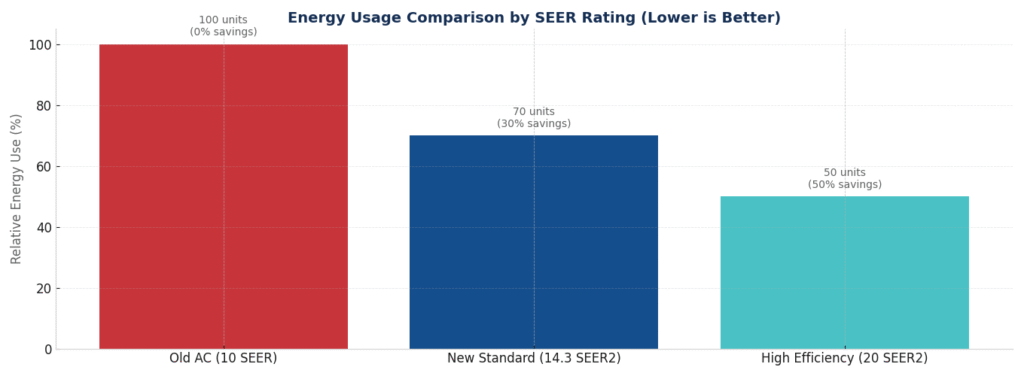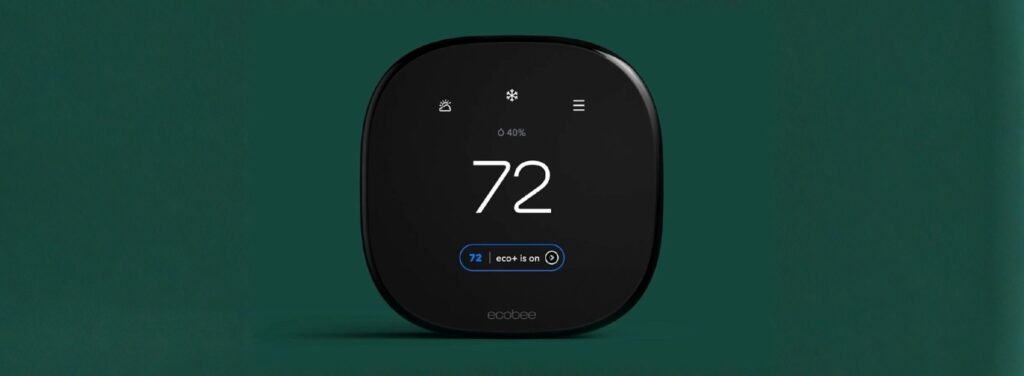As energy costs rise and environmental concerns grow, many homeowners are asking a critical question: “What is an energy efficient AC?” and “How can I make my system more efficient?” An energy-efficient air conditioner is more than just a label; it’s a commitment to lower utility bills, a smaller carbon footprint, and enhanced home comfort. As HVAC professionals, we’re here to explain what makes an AC system efficient and share practical tips for maximizing your cooling savings.
What Defines an Energy Efficient AC?
The efficiency of an air conditioner is measured by how effectively it converts electricity into cooling power. The higher the efficiency, the less energy it consumes to cool your home.
The Energy Efficiency Ratio for AC (EER & SEER)
The two most important metrics for measuring AC efficiency are EER and SEER.
- EER (Energy Efficiency Ratio): Measures the cooling efficiency of an AC unit under a single set of conditions (95°F outside, 80°F inside). It’s useful for comparing units in a specific high-heat scenario.
- SEER2 (Seasonal Energy Efficiency Ratio 2): This is the most widely used metric. It measures the cooling efficiency over an entire cooling season, reflecting real-world conditions more accurately. The higher the SEER2 rating, the more energy-efficient the unit is.
What Does the ENERGY STAR Logo Mean on Energy-Efficient Air Conditioners?
When browsing HVAC systems or most other major electronic appliances for your home, you may notice a little blue logo that makes all the difference in terms of energy efficiency: ENERGY STAR. An ENERGY STAR logo means that the product complies with all guidelines articulated by the U.S. Environmental Protection Agency (EPA).

Comparing AC Types and Efficiency
Not all air conditioners are created equal. Their efficiency can vary greatly depending on their type.
Are Window AC Units Energy Efficient?
Window AC units are generally less energy efficient than central air systems. While their upfront cost is lower, their EER ratings are typically lower than SEER ratings for central systems. They are designed for cooling a single room, so using multiple window units to cool an entire home is often less efficient than a single, properly sized central system.
Is a Portable AC More Energy Efficient?
No, a portable AC unit is generally the least energy-efficient type of air conditioner. Portable units are often less effective at removing heat and humidity from a space compared to window or central units. A portion of the cooled air is used to vent the hot air out through a hose, which can create negative pressure and draw warm outside air back in.
Are Fans More Energy Efficient Than AC?
Yes, fans are far more energy-efficient than air conditioners, but they serve a different purpose. Fans do not cool the air; they simply circulate it to create a wind-chill effect on your skin, which makes you feel cooler. Fans use a fraction of the electricity of an AC. The U.S. Department of Energy recommends using fans to supplement your AC, allowing you to set your thermostat a few degrees higher without sacrificing comfort.
Actionable Tips for Making Your AC System More Efficient
Even with an energy-efficient AC unit, your habits and home can impact performance.
The Most Energy Efficient AC Temperature
The U.S. Department of Energy recommends setting your thermostat to 78°F when you are home and awake in the summer. When you are away from home, they recommend setting the thermostat 7-10 degrees higher (e.g., 85°F) for at least eight hours to save up to 10% on your energy bill. Contrary to popular belief, turning your thermostat off entirely or setting it to a very low temperature when you return home can cause it to work harder and use more energy to cool the space quickly.
Is It More Energy Efficient to Leave AC On?
No, it is not more energy efficient to leave your AC on when you are not home. While your AC will have to work to cool your home back down when you return, it will be using less energy overall than it would by running all day to maintain a constant, low temperature in an empty house.
Financial Incentives and Brand Reputation
When investing in a new AC, there are financial incentives and HVAC brand considerations to keep in mind.
Tax Credit for Energy Efficient AC Unit
You may be eligible for a tax credit for an energy-efficient AC unit. The Inflation Reduction Act (IRA) of 2022 offers significant tax credits for qualifying high-efficiency home improvements. A central air conditioner can be eligible for a tax credit of up to $600 if it meets specific efficiency tiers. These incentives, along with local hvac rebates, can help offset the initial cost of a new, high-efficiency system.
Are Goodman AC Units Energy Efficient?
Yes, Goodman AC units are energy efficient. Goodman is a well-regarded brand that offers a range of products across different efficiency tiers. Their models range from standard-efficiency units (13-14 SEER2) that meet federal requirements to high-efficiency, variable-speed units with SEER2 ratings of over 20. Goodman is known for providing a solid balance of affordability and efficiency, making it a popular choice for homeowners.
Maximize Your Home Comfort and Savings
Ultimately, an energy-efficient AC system is one that is properly sized, well-maintained, and used in an intelligent way. While upgrading to a new, high-efficiency unit is the best way to ensure long-term savings, even older systems can be made more efficient with simple changes like regular filter replacement, cleaning the outdoor unit, setting your thermostat strategically, and staying on top of AC repairs.
What to Tell Your HVAC Team to Get the Most Energy-Efficient Air Conditioner Installed
When you work with your HVAC team to get the best energy-efficient AC system, ask them about the following:
- Does this system have an ENERGY STAR logo?
- What is the SEER2 rating on this product?
- Do you carry HVAC systems with a SEER2 rating of 20 or higher, like Ruud?
If you ask these questions, you’ll end up with an exceptionally energy-efficient air conditioner. You’ll save money on your energy bill, while remaining perfectly comfortable and cool during the hottest parts of the year. You’ll also feel proud that you’re doing your part to protect our natural resources.
Keeping up a home is an expensive endeavor, so any product that saves money – and still offers incredible performance – is going to be a welcome addition. It is commonly known that when homeowners sell, the prospective buyer will ask about the condition of the HVAC system. Your realtor will be able to make a claim that will surely entice homebuyers; they’ll be able to say your HVAC system is energy-efficient and money-saving, according to ENERGY STAR and the EPA. Not a bad sales tactic!
Now that you have solid information about the best energy-efficient air conditioners, learn more about AC installations.
Need Expert AC Advice? Contact Meyer Heating & Air
Whether you’re ready to upgrade to a new, energy-efficient system or need professional AC services to ensure your current AC unit is running at peak performance, the team at Meyer Heating & Air is here to help. Our certified technicians can provide expert advice on the best system for your home and help you take advantage of all available rebates and incentives. Contact us today for a consultation.

